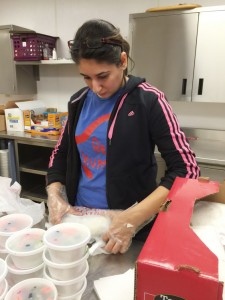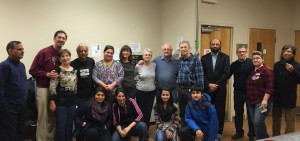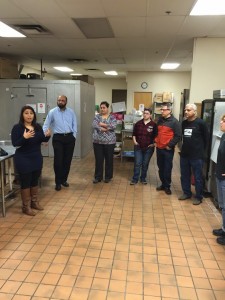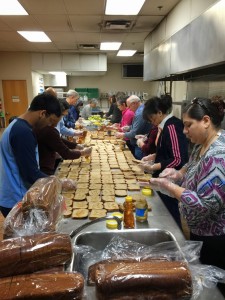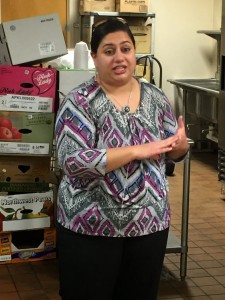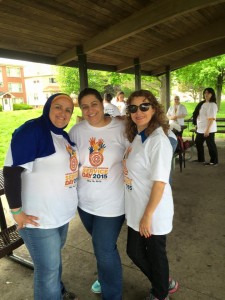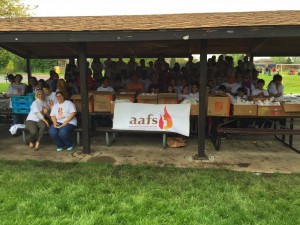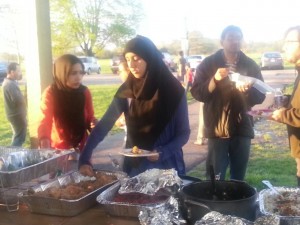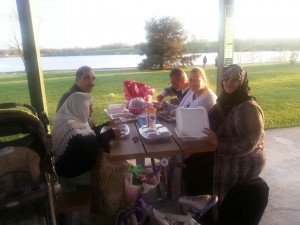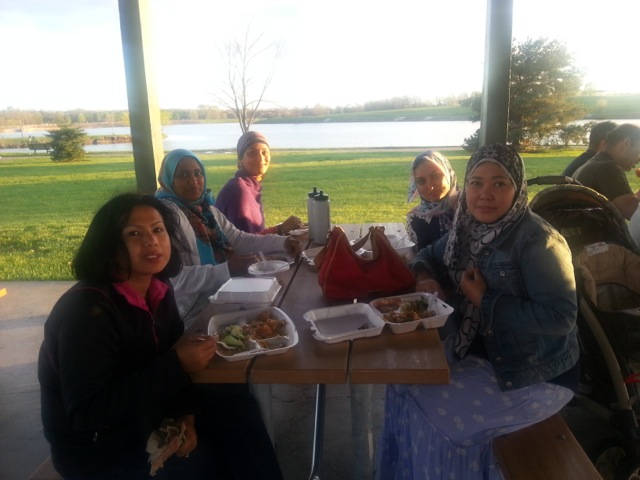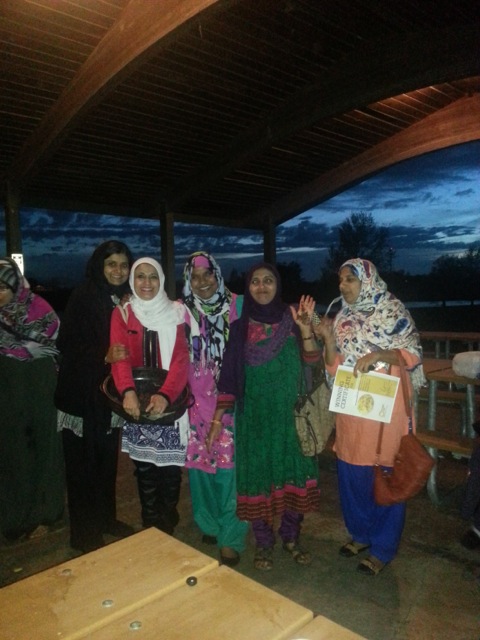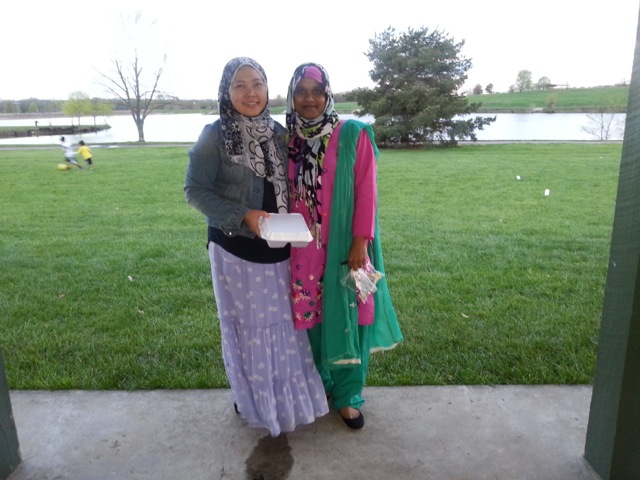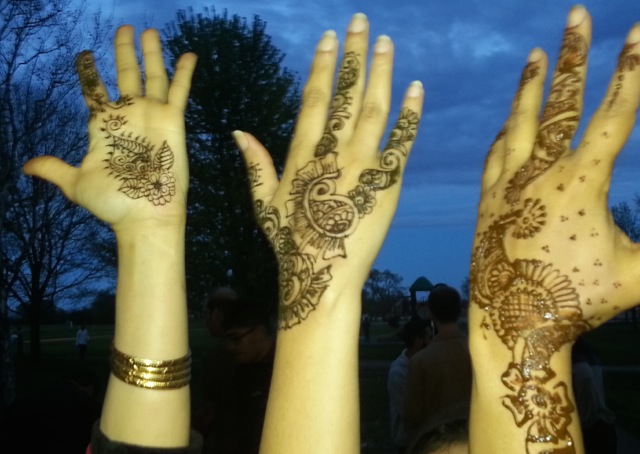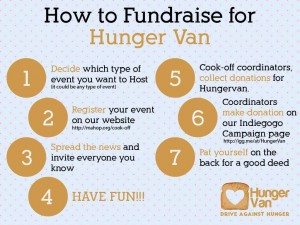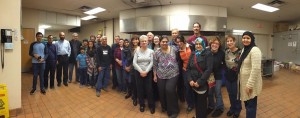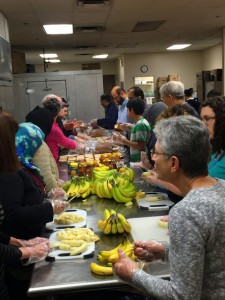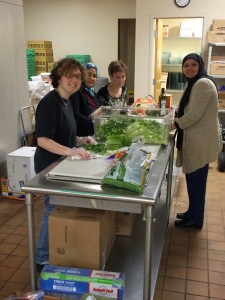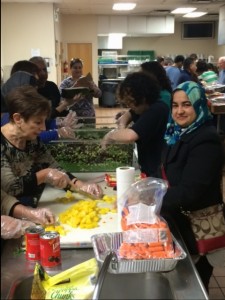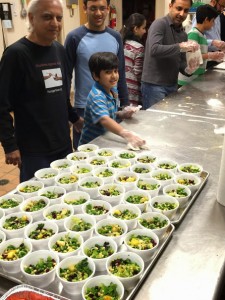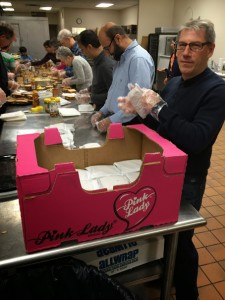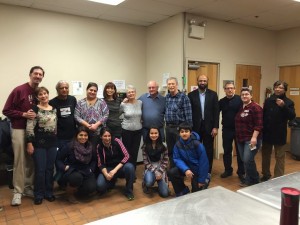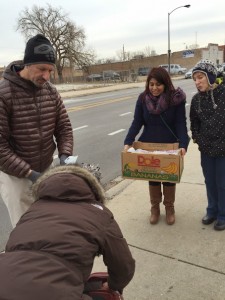







November 8, 2014. It is Sunday morning, and Hunger Van has been invited to a local church in New Brunswick that happens to be equipped with its own kitchen, to make meals for the homeless with an interfaith community. Volunteers gather around the van to carry onto the porch and through the door, supplies they’ll be needing for the kitchen, as quick as possible. Zamir Hassan tells everyone, they’ll be making around 150 meals today.
“Some places are too small to accommodate Hunger Van. We tried to get some new people to volunteer for Hunger Van as an interfaith event,” a tall Muslim woman named Shabana the host of the event  says to everyone.
says to everyone.
“We do this program even in Manhattan’s tiny apartments, and it works. This is great, though; we even have a kitchen to wash pots today. Before you get started, I’d like to know why you’re here?” Zamir Hassan, founder of Muslims Against Hunger, Faith Against Hunger, and Hunger Van, states. Others respond they are there to help out and to meet people’s needs so they’ll have enough to eat. In a circle, they recite their names: Tracy, Karen, Jacquelyn, Alfreda, Chris, Belinda, Diva, and Isha.
‘I’ve always been a volunteer doing things like feeding the homeless; this work is right up my alley,” one woman enthusiastically continues. Another says, “Hunger’s a problem in our society, there’s no reason for it.”
 “To make a small difference means a lot. Once, my son didn’t eat all of his cereal – he’s two by the way – because he doesn’t understand there’s not enough food in the world to feed everyone; and there are plenty of hungry people,” a mother recounts.
“To make a small difference means a lot. Once, my son didn’t eat all of his cereal – he’s two by the way – because he doesn’t understand there’s not enough food in the world to feed everyone; and there are plenty of hungry people,” a mother recounts.
“The government cuts money from homeless programs all the time. This type of work is about engaging people to get involved. The definition of hunger as well as the number of people in the US and number of hungry people are things we’re going to talk about. Can anyone guess the total number of hungry people there are in the United States?” Mr. Hassan continues. One of the children guesses 7 million; an adult guesses 50 million. 49 million is the correct answer. “As a person of faith in a church, is this acceptable?” he inquires. The founder of Hunger Van goes on to inform the crowd about how he started this institution in 2000 in the city of Morristown, NJ when Zamir as chaperone with his son went to feed 200 people at a soup kitchen. “The homeless, they’re in our backyard and people don’t even know it. Muslims are more excited to do good things now, as it so happens.” Mr. Hassan created a training kit, starting an early version of the program asking for volunteers. Now he goes all over the country, doing this sort of thing.
“In August due to pressure from Interfaith groups, the government did not cut funds, but they eventually cut funds. The numbers are up, there are more people, social security checks are cut, so we have to get involved and it’s going to get tougher. By doing this, we make a little dent in this whole issue; today we are making two items, that is: sandwiches and salads,” Zamir Hassan says.
A couple of women already know how to make the Honey-B sandwich, which is simply a concoction of sliced whole wheat, honey, cinnamon, and peanut butter. Hunger Van’s Chicaroo salad is comprised of chopped salad greens, cranberries, green peas, cherry tomatoes, pineapple, slices baby carrots, spices, avocado oil, and olives, and is typically mixed together in a large pot before being divided into 8-oz. cups.
Jacquelyn Juricic of “A Better World Cafe” is here working with Hunger Van. She happens to be the president of the board of Who’s My Neighbor, a non-profit organization. She volunteers at the cafe, has been doing so for five years. She explains that this community cafe makes affordable eating healthy and affordable, has only suggested prices, one complimentary dish is on the menu, and there are vegetarian and vegan options. The other non-profit with the cafe is Elijah’s Promise. The whole business is a volunteer-run operation. The cafe has been serving for more than five years, lunch only; and the food is very good, she says. Better World’s salads are its signature dishes. On the web, more information can be searched for at betterworldcafe.org.
Meanwhile, two kids help to make garnishes for the salad. They say that this is their first Hunger Van event.
By noon, it’s clean up time, though it takes a while since sandwiches are still being made to fill the boxes a batch at a time. Half and hour later, and the crew continues to wrap up sandwiches and wash dishes.
“We want people to tell their friends HungerVan.org’s the website we are using. Hopefully all of you guys had fun today. The best experience is when we hand the stuff out; thanks so very much for coming and let’s do this again!”
Mr. Hassan says the thing to do is go to “Hosting of Hunger Van”, pick a time and date, and see if there’s an open spot for six volunteers and 100 meals. Any house with a kitchen and dining table is good enough for Hunger Van. This type of activity is also helping Jews and Muslims come together to talk about how good they are: you bring Jews and I’ll bring Muslims, that sort of interaction; and these meetings through this program can happen! In fact, on the 16th at Columbia University, there is going to be an intercultural Hunger Van exchange. “In the Quran, more than 200 times, it says salat is done five times, and zakat once a day should be practiced. We usually narrow our definition of faith into what’s convenient for us. This way, as we have done here, we get to practice our faith.”
Click on the link to see more photos: https://plus.google.com/u/0/photos/100326004352196375859/albums/6086174295785573361
About HUNGER VAN
 The Hunger Van was born in 2011 because Muslims Against Hunger founder Zamir Hassan, a practicing Muslim and resident of Bedminster, New Jersey decided that if hungry people such as the ones congregating around parks and train stations, could not come to the food, the food would come to them in vans, conveniently packaged and ready to eat. The cost of producing one hot meal is $6.07 and $4.85 for cold ones; and meals as well as events are donation-based. Sponsors are encouraged to raise funds for the feeding event. All of the food is vegan and can last for a long period of time without spoiling. for more information about Hunger Van project click here
The Hunger Van was born in 2011 because Muslims Against Hunger founder Zamir Hassan, a practicing Muslim and resident of Bedminster, New Jersey decided that if hungry people such as the ones congregating around parks and train stations, could not come to the food, the food would come to them in vans, conveniently packaged and ready to eat. The cost of producing one hot meal is $6.07 and $4.85 for cold ones; and meals as well as events are donation-based. Sponsors are encouraged to raise funds for the feeding event. All of the food is vegan and can last for a long period of time without spoiling. for more information about Hunger Van project click here
The author of this blog, Alice M. Baskous, is a New Jersey resident and Hunter College grad who works in and frequents Manhattan Island where she spends many of her hours studying French, walking around, and writing poetry as well as fiction. She does community service with the homeless as well as hungry locals of Tompkins Square Park in downtown New York City three times a week between 10 AM and 11, and also at other Hunger Van sponsored events.




















